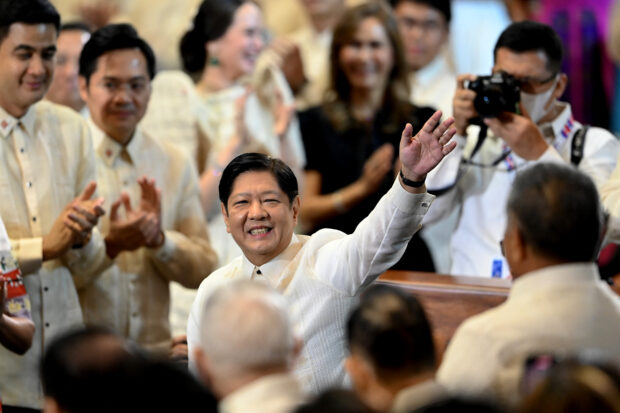Bongbong Marcos: PH digitalization will boost economy; nice tool vs corruption

Philippine President Ferdinand Marcos Jr (C) arrives to deliver his speech during the State of the Nation Address (SONA) at the House of Representatives in Quezon City on July 24, 2023. (Photo by JAM STA ROSA / AFP)
MANILA, Philippines — President Ferdinand “Bongbong” Marcos Jr. is pushing for the complete implementation of digitalization under his administration to provide better services for locals nationwide and combat corruption.
Marcos claimed that digitizing government records and services would help support its science-based planning and decision-making, as well as improve the transaction of the business sector.
“Digitalization is the call of today, not of the future—but of the present. It is here. It is needed, and it is needed today,” the chief executive said during his second state of the nation address at the Batasang Pambansa Complex in Quezon City.
“Data shows that digitalization, in conjunction with the government’s streamlining efforts, has significantly boosted efficiency. Notable examples are in the areas of government payments, company and business registrations, issuance of permits and licenses, loan applications, and revenue collection,” he added.
Marcos said the government is eyeing to incorporate digitization into the country’s payment systems, citing the recent launch of the Department of Information and Communications Technology’s (DICT) eGov application.
Article continues after this advertisement“As envisioned, all key government services are to be integrated into this single and centralized mobile application for the convenience of the general public,” he said, adding that even the digitalization of national IDs will be integrated with eGov apps, accessible to the public.
Article continues after this advertisementAside from the eGov application, the Department of Migrant Workers recently launched the DMW Mobile to make the journey of overseas Filipino workers easier.
Improved internet connectivity
Moreover, Marcos said that nationwide internet speed has also improved, citing that as of June this year, the country’s fixed broadband speed ranks 47 of the 180 other countries.
“This ranking is 11 places higher than it was in 2022. Our mobile internet speed is now ranked at 83 out of 142 countries, which is eight places higher than it was last year,” he revealed.
“There will be more improvements as our internet infrastructure undergoes further upgrades. Early this year, Starlink went live in the Philippines, now providing high-speed satellite broadband connectivity. Our National Fiber Backbone and Broadband ng Masa projects will also deliver high connectivity and high-speed internet. We are prioritizing geographically isolated and disadvantaged areas,” he added.
The chief executive said that DICT received an order to consolidate all digitized government services within the applications mentioned above to establish the National Government Portal and the Philippine Business Databank and improve the internet speed in our country.
RELATED STORIES:
Bongbong Marcos hails BARMM progress: Former enemies are now allies in peace
Marcos promises to curb drug dependency among drug users